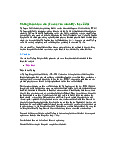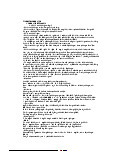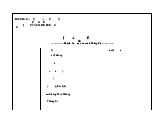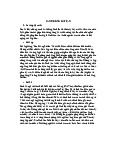


Preview text:
THE BRITISH PARLIAMENT
1. Compare the House of Lords and the House of Commons.
Which one is more powerful? Similarity:
The business of Parliament takes place in two Houses: the House of
Commons and the House of Lords. Their work is similar: making laws
(legislation), checking the work of the government (scrutiny), and debating current issues.
The House of Commons is also responsible for granting money to the
government through approving Bills that raise taxes. Generally, the decisions
made in one House have to be approved by the other.
In this way the two-chamber system acts as a check and balance for both Houses. Differences :
-The House of Commons: the people elected at the General Election = MPs
( members of Parliament) = five years + people in other polictical parties,
those in the winning party who were not chosen to be ministers.
- The House of Lords: mostly appointed ( for life) by the Prime minister
( for their achievements and experience), many do not belong to a political
party. Members are called “ Peers”
House of Commons:
- The first chamber of UK Parliament
- Role: the backbone of UK’s political life
- Resposibility: holds the main power of UK, including:
Exam & challenge the work of the government
Propose, debate and pass all laws
Enable the Government to raise taxes
Form committee to investigate and solve issues. House of Lords
799 members in total, including:
- The Bishops (a.k.a The Lords Spiritual)
- The Aristocracy ( a.k.a The Lords Temporal) Aristocrats ( hereditary) - Life peerages Retired politicians Older members of MPs
→ The end of 20th C, life peers form a majority at ít sitting
→1999, aristocrats limited to 92 ( 15% of total members)
→ Life peerage: increased & increased
- The second chamber of UK Parliament
- Has its own Speaker, but no party has the overall control ( like the Commons)
- The Lord Speaker: elected by members of the House of Lords/ five years - Role: Consultant
→ Has little, if any, real power → Limited influence
→ Advantage: independent voices
The Commons can be argued to be more powerful than the Lords because:
Lords can only delay bills, and suggest amendments, which can then
be overturned by the Commons (for example, in __2017 __the Lords
attempted to add amendments onto the passing of the Article 50 bill to
trigger the exit from the EU which guaranteed EU citizens’ rights for
those already living in the UK. This was swiftly overturned by the Commons)
Commons can actually vote down legislation, unlike the Lords
Commons has vote of no confidence option, unlike the Lords
MPs are more independently-minded than in the past, so are less likely
to toe the party line- this makes the Commons more assertive against the government
Commons is democratically legitimate- they have more of a right to challenge government
Committees and PMQs are used to scrutinise government- the Prime
Minister does not appear before the Lords to be challenged
2. Why can't the British monarch enter the House of Commons?
Ever since King Charles I tried to arrest lawmakers in 1642 and
ended up deposed, tried and beheaded, the monarch has been
barred from entering the Commons chamber.
In another symbol of the struggle between Commons and crown, a
lawmaker is ceremonially held hostage at Buckingham Palace during
the ceremony to ensure the royals' safe return.




